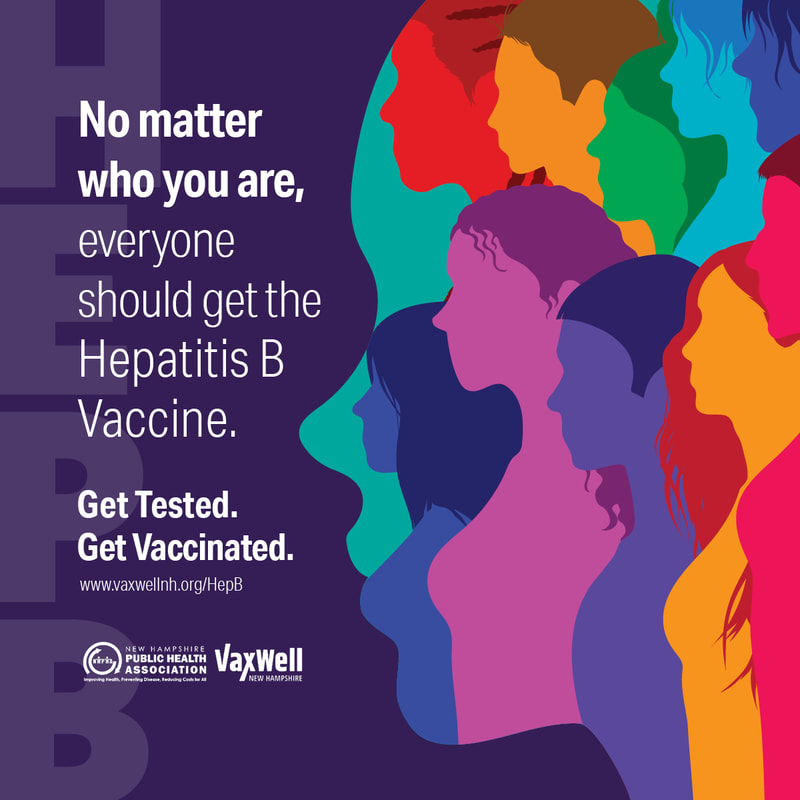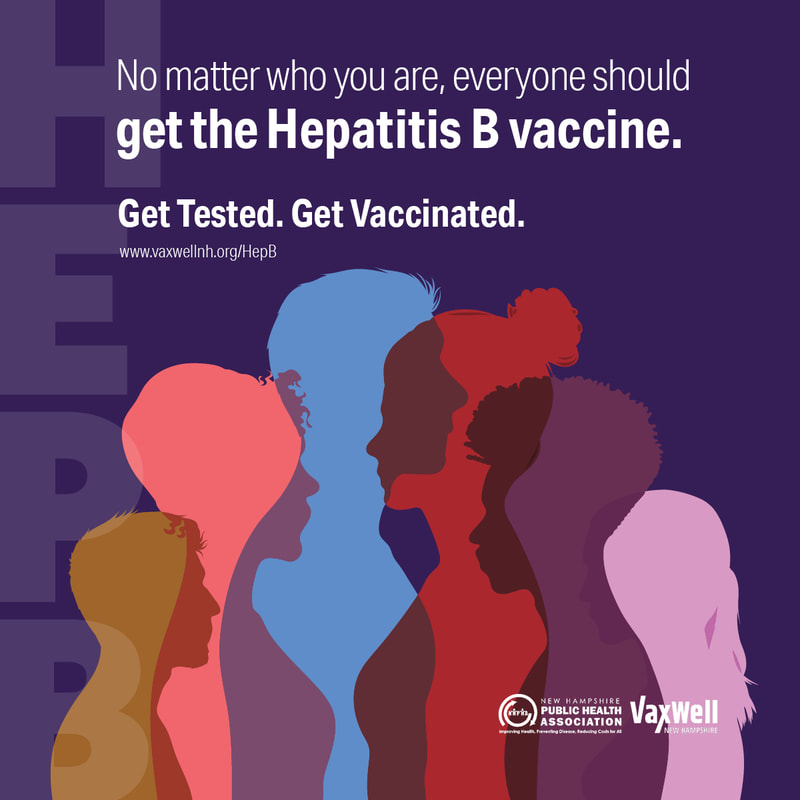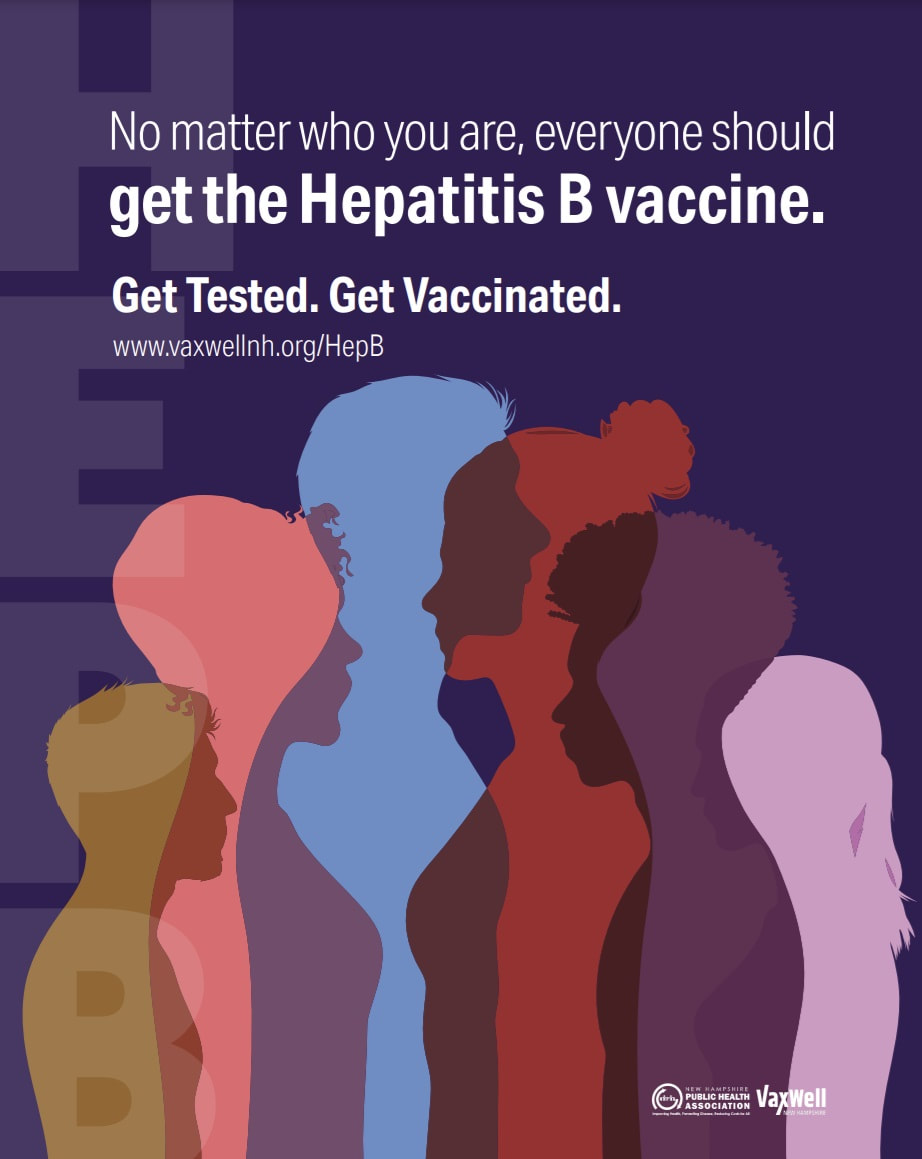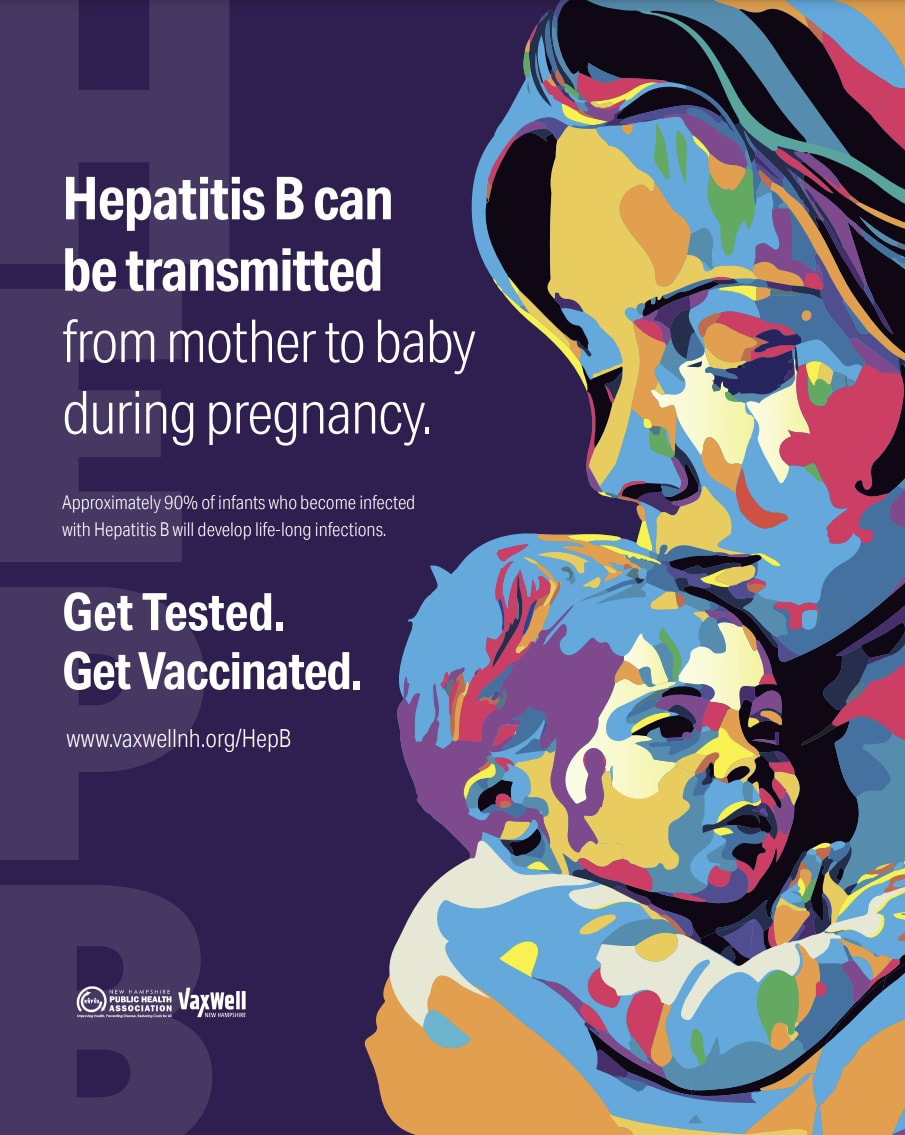Hepatitis B (HepB) Disease
Talking Points: Adults
|
Social Media Messages: Adults
|
| ||||||||||||
Hepatitis B (HepB) Vaccine
Talking Points: Adults
- Hepatitis B is a preventable disease. The best way to prevent the infection is by getting vaccinated. HepB vaccine is safe and effective.
- CDC recommends that all adults aged 19–59 years should be vaccinated for Hepatitis B. Adults aged ≥60 years with risk factors** for hepatitis B should receive HepB vaccines. Adults aged ≥60 years without known risk factors for hepatitis B may also receive HepB vaccines.
- To be fully protected, one needs to complete all the doses in the recommended series. If a dose in the series is missed, the series does not need to be restarted. Healthcare providers can resume where someone left off and complete the vaccine series.
- The HepB vaccine may be given on the same day as other vaccines.
- Once someone receives a complete HepB vaccine series (appropriate for their age), they are protected for decades. Scientists do not believe that someone who is healthy needs booster doses. Some people who have a suppressed immune system or people who are on dialysis treatment for kidney disease may need additional or larger doses of the hepatitis B vaccine.
- As with other vaccines, the most common side effects seen after HepB vaccination include pain, redness, swelling at the site where they were injected, fever, and headache. These symptoms are typically mild and go away in a couple of days.
- The HepB vaccine series consists of 2 or more doses, depending on the brand of vaccine used, the health status of the person receiving the vaccine, the reason for use (occupation, travelling), etc.
Reference: https://www.cdc.gov/hepatitis/hbv/bfaq.htm
Background Information: Adults
Excerpts from the following sources have been shared below. Please refer to them for more detailed information:
Screening recommendations
CDC recommends that healthcare providers screen all adults 18 years and older for Hepatitis B (HBV) infection at least once during their lifetime using the triple panel test, which includes hepatitis B surface antigen (HBsAg), antibody to hepatitis B surface antigen (anti-HBs), and total antibody to hepatitis B core antigen total anti-HBc).
CDC also recommends screening all pregnant people for hepatitis B surface antigen (HBsAg) during each pregnancy, regardless of vaccination status or history of testing. Screening should preferably occur in the first trimester. Pregnant people with a history of appropriately timed triple panel screening and who do not have a subsequent risk for exposure to Hepatitis B virus (HBV) (i.e., no new HBV exposures since triple panel screening) only need HBsAg screening.
Following vaccination, anti-HBs levels decline over time. Anti-HBs levels of ≥10 mIU/mL is considered a correlate of vaccine-induced protection for people who have completed an approved vaccination series. Immunocompetent people who achieve an anti-HBs level ≥10 mIU/mL 1–2 months after completing the hepatitis B vaccine series remain protected, even if anti-HBs levels decline to <10 mIU/mL beyond that time (presumably because of persistent cellular immunity).
https://www.cdc.gov/mmwr/preview/mmwrhtml/rr6210a1.htm
For additional guidance on screening and testing specific populations (e.g. healthcare personnel, patients on dialysis, perinatally exposed infants, and people exposed to HBV), visit https://www.cdc.gov/hepatitis/hbv/testingchronic.htm and https://www.cdc.gov/hepatitis/hbv/hbvfaq.htm.
Vaccine recommendations
CDC’s Advisory Committee on Immunization Practices (ACIP) recommendations for hepatitis B (HepB) vaccine for adults include:
The following people should receive the HepB vaccine:
The following people may receive the HepB vaccine:
** Risk factors for hepatitis B infection include:
Vaccines and vaccine schedule
Several HepB vaccines are available, some single component, others combination vaccine products. Some are licensed for only certain age groups. Please see the detailed table at https://www.cdc.gov/hepatitis/hbv/hbvfaq.htm#D4.
Adults 19 through 59 years of age should complete a 2-, 3- or 4-dose series
People 60 years or older with diabetes: Based on shared clinical decision-making, may receive a 2-, 3-, or 4-dose series as above.
For special situations (including for patients on dialysis) and for more details on the HepB vaccine schedule, visit CDC recommendations here.
Implementing HepB Vaccine guidelines
CDC recommends that healthcare providers do the following to ensure that persons at risk for HBV infection are vaccinated: (Excerpts below from https://www.cdc.gov/hepatitis/hbv/vaccadults.htm)
If the HepB vaccine schedule is interrupted, the vaccine series does not need to be restarted. Clinicians may continue the series from where it was left off with the following considerations:
HepB vaccine may be administered on the same clinic day as other vaccines. This has not been shown to interfere with antibody response. Best practices should be utilized when administering separate injectable vaccines at the same visit, including using separate body sites and syringes.
Currently, booster doses of the HepB vaccine are not generally recommended for people with normal immune status who have completed an age-appropriate HepB vaccine series.
Only certain people are recommended to receive a booster dose.
For patients on hemodialysis, if annual testing for antibody to hepatitis B surface antigen (anti-HBs) shows a decline to <10 mlU/mL, a booster dose should be administered. For other immunocompromised people (including those with HIV, hematopoietic stem-cell transplant recipients, and people receiving chemotherapy), the need for booster doses has not been determined. When anti-HBs levels decline to <10 mIU/mL, annual anti-HBs testing, and booster doses should be considered for those with an ongoing risk for exposure.
Studies indicate that immunologic memory remains intact for at least 30 years among healthy people who initiated hepatitis B vaccination at less than 6 months of age. The HepB vaccine confers long-term protection against clinical illness and chronic hepatitis B virus infection. Cellular immunity appears to persist even though antibody levels might become low or decline below detectable levels. There are ongoing long-term follow-up studies among vaccinated cohorts underway who initiated hepatitis B vaccination at birth, to determine the duration of vaccine-induced immunity.
Contraindications and precautions to vaccination
Like other vaccines, a history of a severe allergic reaction (anaphylaxis) to a vaccine component or following a prior dose is a contraindication to receiving further doses. Moderate or severe acute illness (with or without fever) in a patient is considered a precaution to vaccination, although persons with minor illness may be vaccinated.
HepB vaccination is contraindicated for persons with a history of hypersensitivity to yeast or any other vaccine component.
Some presentations of HepB vaccines contain latex, which may cause allergic reactions.
Heplisav-B and PreHevbrio are not recommended in pregnancy due to a lack of safety data in pregnant persons. Providers may use other HepB vaccines if HepB vaccination is indicated in pregnancy.
HepB Vaccination is not contraindicated in persons with a history of multiple sclerosis, Guillain-Barré syndrome, autoimmune disease (e.g., systemic lupus erythematosis or rheumatoid arthritis) or other chronic diseases.
Perinatal transmission of Hepatitis B virus
When an infant is exposed to the Hepatitis B virus (HBV) infection in utero, this can pose a serious risk to the infant at birth. Without postexposure immunoprophylaxis, approximately 40% of infants born in the United States to mothers infected with the HBV virus mothers will develop chronic HBV infection, approximately one-fourth of whom will eventually die from chronic liver disease. National strategy guidelines to eliminate hepatitis B in the United States call for:
- CDC: HepB vaccination of Adults
- The Pink Book, The Epidemiology and Prevention of Vaccine-Preventable Diseases, Hepatitis B Chapter
- CDC: Perinatal Transmission
- CDC: Screening and Testing for HBV infection
Screening recommendations
CDC recommends that healthcare providers screen all adults 18 years and older for Hepatitis B (HBV) infection at least once during their lifetime using the triple panel test, which includes hepatitis B surface antigen (HBsAg), antibody to hepatitis B surface antigen (anti-HBs), and total antibody to hepatitis B core antigen total anti-HBc).
CDC also recommends screening all pregnant people for hepatitis B surface antigen (HBsAg) during each pregnancy, regardless of vaccination status or history of testing. Screening should preferably occur in the first trimester. Pregnant people with a history of appropriately timed triple panel screening and who do not have a subsequent risk for exposure to Hepatitis B virus (HBV) (i.e., no new HBV exposures since triple panel screening) only need HBsAg screening.
Following vaccination, anti-HBs levels decline over time. Anti-HBs levels of ≥10 mIU/mL is considered a correlate of vaccine-induced protection for people who have completed an approved vaccination series. Immunocompetent people who achieve an anti-HBs level ≥10 mIU/mL 1–2 months after completing the hepatitis B vaccine series remain protected, even if anti-HBs levels decline to <10 mIU/mL beyond that time (presumably because of persistent cellular immunity).
https://www.cdc.gov/mmwr/preview/mmwrhtml/rr6210a1.htm
For additional guidance on screening and testing specific populations (e.g. healthcare personnel, patients on dialysis, perinatally exposed infants, and people exposed to HBV), visit https://www.cdc.gov/hepatitis/hbv/testingchronic.htm and https://www.cdc.gov/hepatitis/hbv/hbvfaq.htm.
Vaccine recommendations
CDC’s Advisory Committee on Immunization Practices (ACIP) recommendations for hepatitis B (HepB) vaccine for adults include:
The following people should receive the HepB vaccine:
- All adults 19 through 59 years of age, regardless of risk factors for hepatitis B.
- Adults 60 years and older with risk factors** for hepatitis B
The following people may receive the HepB vaccine:
- Adults 60 years and older without known risk factors** for hepatitis B
** Risk factors for hepatitis B infection include:
- Persons at risk for infection by sexual exposure
- Sex partners of persons who test positive for hepatitis B surface antigen (HBsAg)
- Sexually active persons who are not in a long-term, mutually monogamous relationship (e.g., persons with more than one sex partner during the previous 6 months)
- Persons seeking evaluation or treatment for a sexually transmitted infection
- Men who have sex with men
- Persons at risk for infection by percutaneous or mucosal exposure to blood
- Persons with current or recent injection use
- Household contacts of persons who test positive for HBsAg
- Residents and staff of facilities for persons with developmental disabilities
- Health care and public safety personnel with reasonably anticipated risk for exposure to blood or blood-contaminated body fluids
- Persons on maintenance dialysis, including in-center or home hemodialysis and peritoneal dialysis, and persons who are predialysis
- Persons with diabetes at the discretion of the treating clinician
- Others:
- International travelers to countries with high or intermediate levels of endemic hepatitis B virus (HBV) infection (HBsAg prevalence of ≥2%)
- Persons with hepatitis C virus infection
- Persons with chronic liver disease (including, but not limited to, persons with cirrhosis, fatty liver disease, alcoholic liver disease, autoimmune hepatitis, or an alanine aminotransferase [ALT] or aspartate aminotransferase [AST] level greater than twice the upper limit of normal)
- Persons with HIV infection
- Incarcerated persons
Vaccines and vaccine schedule
Several HepB vaccines are available, some single component, others combination vaccine products. Some are licensed for only certain age groups. Please see the detailed table at https://www.cdc.gov/hepatitis/hbv/hbvfaq.htm#D4.
Adults 19 through 59 years of age should complete a 2-, 3- or 4-dose series
- 2-dose series only applies when 2 doses of Heplisav-B* are used at least 4 weeks apart
- 3-dose series Engerix-B, PreHevbrio*, or RecombivaxHB at 0, 1, 6 months [minimum intervals: dose 1 to dose 2: 4 weeks/dose 2 to dose 3: 8 weeks/dose 1 to dose 3: 16 weeks])
- 3-dose series HepA-HepB (Twinrix at 0, 1, 6 months [minimum intervals: dose 1 to dose 2: 4 weeks/dose 2 to dose 3: 5 months])
- 4-dose series HepA-HepB (Twinrix) accelerated schedule of 3 doses at 0, 7, and 21–30 days, followed by a booster dose at 12 months
People 60 years or older with diabetes: Based on shared clinical decision-making, may receive a 2-, 3-, or 4-dose series as above.
For special situations (including for patients on dialysis) and for more details on the HepB vaccine schedule, visit CDC recommendations here.
Implementing HepB Vaccine guidelines
CDC recommends that healthcare providers do the following to ensure that persons at risk for HBV infection are vaccinated: (Excerpts below from https://www.cdc.gov/hepatitis/hbv/vaccadults.htm)
- Offer HepB vaccination to all adults aged 19–59 years who have not previously completed vaccination and adults > 60 years with risk factors for hepatitis B or without identified risk factors but seeking protection.
- Implement standing orders to administer the HepB vaccine as part of routine services to adults who have not completed the vaccine series.
- Offer HepB vaccination, when feasible, in outreach and other settings in which services are provided to persons at risk for HBV infection (e.g., syringe services programs, HIV testing sites, HIV prevention programs, homeless shelters).
If the HepB vaccine schedule is interrupted, the vaccine series does not need to be restarted. Clinicians may continue the series from where it was left off with the following considerations:
- If the vaccine series was interrupted after the first dose, the second dose should be administered as soon as possible.
- The second and third doses should be separated by an interval of at least 8 weeks.
- If only the third dose is delayed, it should be administered as soon as possible.
HepB vaccine may be administered on the same clinic day as other vaccines. This has not been shown to interfere with antibody response. Best practices should be utilized when administering separate injectable vaccines at the same visit, including using separate body sites and syringes.
Currently, booster doses of the HepB vaccine are not generally recommended for people with normal immune status who have completed an age-appropriate HepB vaccine series.
Only certain people are recommended to receive a booster dose.
For patients on hemodialysis, if annual testing for antibody to hepatitis B surface antigen (anti-HBs) shows a decline to <10 mlU/mL, a booster dose should be administered. For other immunocompromised people (including those with HIV, hematopoietic stem-cell transplant recipients, and people receiving chemotherapy), the need for booster doses has not been determined. When anti-HBs levels decline to <10 mIU/mL, annual anti-HBs testing, and booster doses should be considered for those with an ongoing risk for exposure.
Studies indicate that immunologic memory remains intact for at least 30 years among healthy people who initiated hepatitis B vaccination at less than 6 months of age. The HepB vaccine confers long-term protection against clinical illness and chronic hepatitis B virus infection. Cellular immunity appears to persist even though antibody levels might become low or decline below detectable levels. There are ongoing long-term follow-up studies among vaccinated cohorts underway who initiated hepatitis B vaccination at birth, to determine the duration of vaccine-induced immunity.
Contraindications and precautions to vaccination
Like other vaccines, a history of a severe allergic reaction (anaphylaxis) to a vaccine component or following a prior dose is a contraindication to receiving further doses. Moderate or severe acute illness (with or without fever) in a patient is considered a precaution to vaccination, although persons with minor illness may be vaccinated.
HepB vaccination is contraindicated for persons with a history of hypersensitivity to yeast or any other vaccine component.
Some presentations of HepB vaccines contain latex, which may cause allergic reactions.
Heplisav-B and PreHevbrio are not recommended in pregnancy due to a lack of safety data in pregnant persons. Providers may use other HepB vaccines if HepB vaccination is indicated in pregnancy.
HepB Vaccination is not contraindicated in persons with a history of multiple sclerosis, Guillain-Barré syndrome, autoimmune disease (e.g., systemic lupus erythematosis or rheumatoid arthritis) or other chronic diseases.
Perinatal transmission of Hepatitis B virus
When an infant is exposed to the Hepatitis B virus (HBV) infection in utero, this can pose a serious risk to the infant at birth. Without postexposure immunoprophylaxis, approximately 40% of infants born in the United States to mothers infected with the HBV virus mothers will develop chronic HBV infection, approximately one-fourth of whom will eventually die from chronic liver disease. National strategy guidelines to eliminate hepatitis B in the United States call for:
- Preventing perinatal HBV transmission by identifying HBV-infected (i.e., hepatitis B surface antigen [HBsAg]-positive) pregnant persons and providing hepatitis B immune globulin and hepatitis B vaccine to their infants within 12 hours of birth.
- Implementing universal screening of pregnant persons for HBsAg during each pregnancy.
- Performing HBV DNA testing for HBsAg-positive pregnant persons at 26-28 weeks to guide the use of maternal antiviral therapy during pregnancy. AASLD suggests maternal antiviral therapy when HBV DNA is >200,000 IU/mL
- Case management of HBsAg-positive mothers and their infants
- Providing immunoprophylaxis for infants born to infected mothers, including the hepatitis B vaccine and hepatitis B immune globulin, within 12 hours of birth
- Routinely vaccinating all infants with the hepatitis B vaccine series, with the first dose administered within 24 hours of birth.
Hepatitis B Resources
ACIP Updated Recommendations HepB Vaccine Adults, 2022: Universal Hepatitis B Vaccination in Adults Aged 19–59 Years: Updated Recommendations of the Advisory Committee on Immunization Practices — United States, 2022
ACIP Recommendations HepB Vaccine, 2018: Prevention of Hepatitis B Virus Infection in the United States: Recommendations of the Advisory Committee on Immunization Practices
CDC: Professional Resources
CDC: Patient Education Resources (HepB)
ACIP Recommendations HepB Vaccine, 2018: Prevention of Hepatitis B Virus Infection in the United States: Recommendations of the Advisory Committee on Immunization Practices
CDC: Professional Resources
CDC: Patient Education Resources (HepB)
|
VAXWELL NH COALITION
NEW HAMPSHIRE PUBLIC HEALTH ASSOCIATION (NHPHA) 4 Park Street, Ste 201 Concord, NH 03301 United States Email: info@nhpha.org |
(c) 2024 NHPHA. All Rights Reserved.





